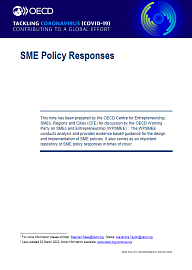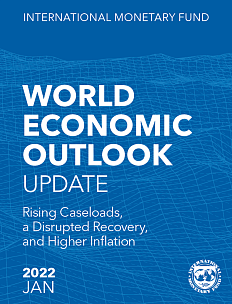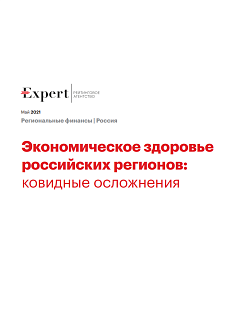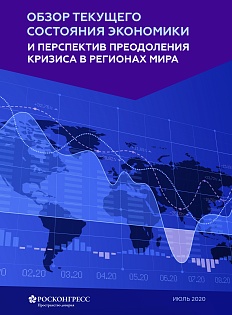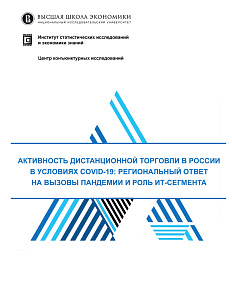This publication was prepared by the OECD Centre for Entrepreneurship, SMEs, Regions and Cities (CFE). It examines how SMEs are likely to be affected by the current coronavirus epidemic, reports on early evidence and estimates about the impact, and provides a preliminary inventory of country responses to foster SME resilience.
The authors acknowledge that, given the rapid pace of developments, the overview of country responses is not comprehensive and, in some cases, includes intended policy responses that are still a work in progress, or simply at the stage of public announcements. The authors emphasize that the overview will be updated periodically.
The Roscongress Foundation presents the salient points of the publication accompanied by broadcasts of relevant panel discussions from the business programme of key international events held by the Roscongress Foundation.
1)The pandemic has a negative effect on the economy
Individual countries and the global economy are affected by the pandemic in a negative way. For example, UNCTAD has calculated that the impact of the coronavirus in China has cost global value chains 50 billion USD in exports. Several banks and institutes have also made strong negative adjustments to their GDP growth forecasts for 2020.
2)Statistics for the effect of the pandemic on SMEs across countries are limited
With few exceptions, so far limited empirical evidence is available on how the situation affects SMEs across OECD countries. Some first evidence is emerging from surveys, which suggest major disruptions in the most affected countries and mounting concerns in others. Based on a survey of SMEs in February, reports on China showed that a third of SMEs only had enough cash to cover fixed expenses for a month, with another third running out within two months, putting millions of Chinese SMEs at risk. Reporting on 14 March, suggests 60% of Chinese SMEs are back in business, but now face further challenges due to reduced demand from other markets.
3)There are several ways the coronavirus pandemic may affect the economy, especially SMEs, on both the supply and demand sides
On the supply side, companies could experience a reduction in the supply of labour, while measures to contain the disease by lockdowns and quarantines lead to further and more severe drops in capacity utilisation. Furthermore, supply chains may be interrupted leading to shortages of parts and intermediate goods. On the demand side, a dramatic and sudden loss of demand and revenue for SMEs could severely affect their ability to function. Furthermore, consumers may experience loss of income, fear of contagion and heightened uncertainty, which in turn reduces spending and consumption. These effects may be compounded when workers are laid off and firms are not able to pay salaries. SMEs may be more vulnerable to ‘social distancing’ than other companies. Businesses, including SMEs, will bear the brunt of a reduction in global demand for their products and services.
4)Countries are taking a variety of measures to support SMEs
The publication gives detailed descriptions of policies adopted by countries to respond to the situation and to support SMEs.
For example, several governments have taken measures to ensure that information on the prevention and containment of the virus reaches SMEs (e.g. Luxembourg, Netherlands, Portugal, United Kingdom, Switzerland). Several countries are actively informing firms about how to reduce working hours, provide relief for workers and companies, and redundancy payments in temporary lay-offs and sickness (e.g. Belgium, France, Netherlands, Switzerland).
Countries have set up a variety of financial facilities to help companies address the short-term consequences of the outbreak as part of wider fiscal policy responses. These include:
- Various countries provide possibilities for temporary tax relief such as the deferral of tax payment (e.g. Australia, Belgium, France) and tax cuts and tax credits (Italy).
- The United States has opened up the Disaster Relief Loan Programme for small business affected by the situation.
- Several countries have introduced direct financial support to SMEs, such as new credits granted by public investment banks (France), zero-interest loans with no collateral (Japan), reducing the time required for banks to provide credit approval (Israel), sectoral support, especially for the tourism industry (e.g. Australia, Chile, Italy), new public guarantees (Austria, Japan, Korea, Israel), account receivable insurance (Korea) and the mobilisation of credit mediation for SMEs wishing to renegotiate credit terms (France).
Several countries are taking measures concerning procurement and payment delays. For example, France and Belgium have suspended penalties for payment delays on government contracts.
Finally, commercial banks in several countries have introduced support packages that include emergency loans to support their SME clients as well as flexibility for repayments of existing loans, for example in Korea, Singapore and Malaysia. In Italy, backed by the Government, the Italian Banking Association and several business associations have agreed on a large-scale moratorium on debt repayments, including mortgages and repayments of small loans and revolving credit lines for businesses.
Some countries are providing more forward-looking support for companies to strengthen their business resilience. In Queensland, Australia a mentoring programme and financial workshops have been set up to assist small companies to address further impacts on their businesses. China supports SME digitalisation and innovation, includes training and aims to foster SME and MNE cooperation in the context of the crisis.
The authors of the publication note that, as Italy was exposed to the COVID-19 epidemic and its economic repercussions earlier than any other EU country, its responses are of particular interest. Within the Italian institutional setting, regions play a major role in economic development matters and SME policies. This is why the report includes a regional perspective to gain a full picture across different levels, beyond central government policies.
For more information about policy responses to the coronavirus outbreak and possible ways to stabilize the economy during the pandemic, please see the COVID-19 and StayHomeEconomy special sections of the Roscongress information and analytical system.


